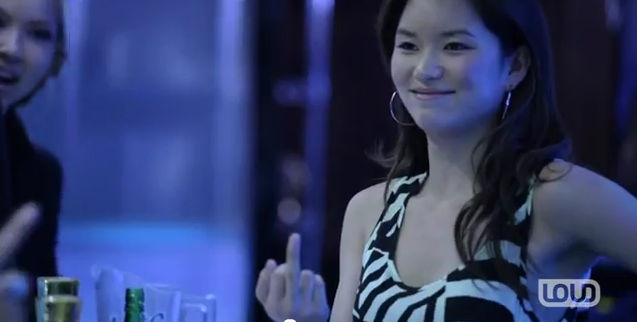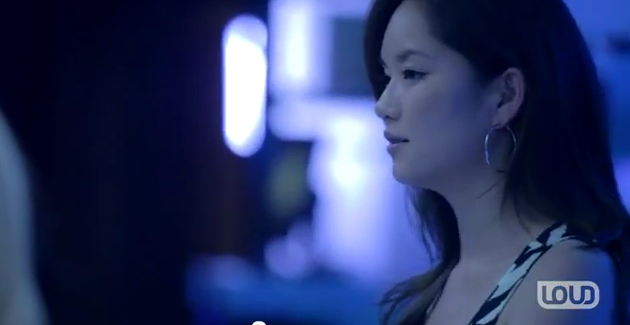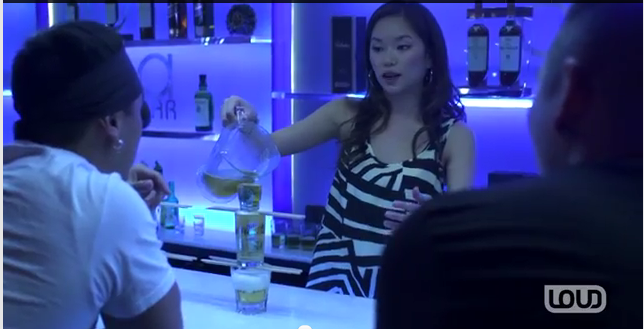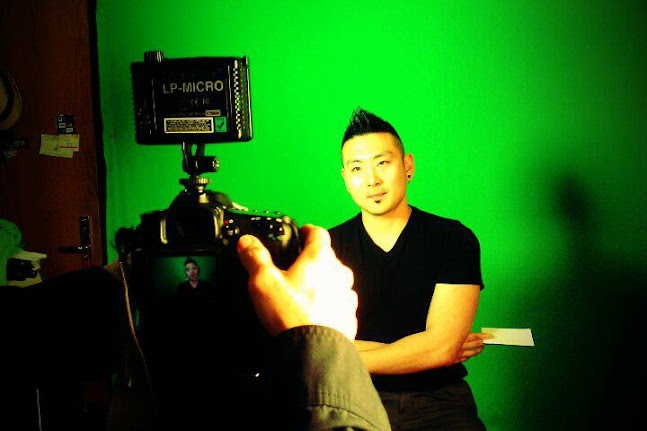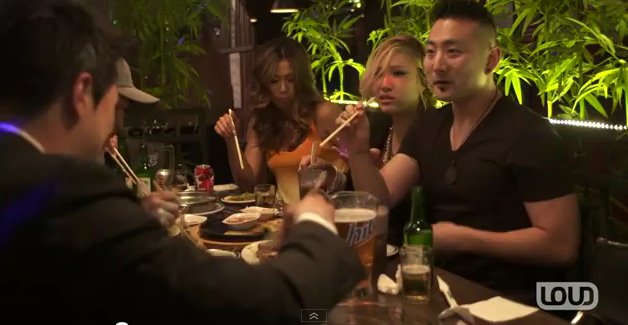
- Electus
- Jowe Lee of “K-Town.”
Back in 2010, when word first leaked that someone was planning a reality show set against the non-stop, over-the-top party landscape of Los Angeles’s Koreatown, the gossip rags snickered — Soon-Yi meets Snooki! — and the greybeards of the Korean America shuddered — This show will make us look like a community of drunken meatheads and dimwitted tramps!
“And this was before anyone had even
seenanything,” says executive producer Mike Le, who developed the “
K-Town“ concept with producers Eddie Kim and Eugene Choi. “We put out a Craigslist call saying we were looking for interesting Asian Americans for a Jersey Shore-type reality show, and within 48 hours, the story had been picked up by the Los Angeles Times and the New York Post, and Chelsea Handler mentioned it on ‘Chelsea Lately.’ That Saturday, SNL worked it into Weekend Update.”
In short, the buzz on “K-Town” was building before a single castmember had been selected, before the first stunt or catty blindside had been captured on tape — and before it was revealed that the production company behind “K-Town” was Tyrese Gibson’s production company HQ Productions, where Le is vice president, making the project rather more credible than a random Craigslist ad might entail.
“Once we shot our sizzle reel, things got even crazier,” says Le. “TMZ started following the cast on Facebook. We were written up in The New Yorker and OK magazine. We started to think we really had something.”
So did Hollywood. “Once we started shopping it around town, we got interest everywhere we went. There was a bidding war between two networks, and we went with one of them.”
And then? “And then things didn’t work out.”
According to Le, a combination of “regime change” and a refusal by the net’s new guard to let the producers make the show they’d had in mind led to the show going on an extended hiatus — one that as of last Wednesday, had lasted almost two and a half years. That’s when the first episode of the new,
no-holds-barred online edition of K-Town was unveiled, as the tentpole property of LOUD, a newly launched YouTube channel from equally new
startup Electus.
The studio, founded by NBC wunderkind Ben Silverman in partnership with Barry Diller’s digital powerhouse IAC, is the latest attempt to blur the lines between traditional television content and web video. “We want to create programming that users will want to spend more time with, and we’re doing it by making each show have creative elements from both TV and YouTube: High-impact, buzz-worthy content that will get people talking,” says Drew Buckley, Electus’s COO.
“High-impact” and “buzz-worthy” seem like apt terms to describe K-Town — now dubbed “the reality show no TV network could show you.” The show’s teaser trailer features epileptic flashes of castmembers bootyshaking in their lingerie, licking liquor off one anothers’ bodies, tongue-tangling and pelvis-grinding in various gender combinations and drunkenly punching each other senseless — in short, engaging in activities that are not commonly associated with Asian Americans in mainstream media.
And that, says Mike Le, is the point.
“I think we as Asians have a tendency to embrace our own ‘model minority’ hype,” he says. “To me, that one-dimensional, positive stereotype is as bad as the images in the mass media that depict us only as ninjas or dragon ladies or asexual IT guys. Yes, the interest in the show is Asians going wild — you better believe that when we took it around to the networks, the old white execs we showed it to were popping their eyes out. But in reality, K-Town’s about the fact that all the stereotypes, good or bad, don’t fit when you’re talking about real people. Our cast doesn’t represent all Asians. They simply represent themselves.”
Of course, the selves they represent on the show aren’t “real people” in their full, nuanced complexity either; it wouldn’t be “reality TV” otherwise. So the castmembers have their respective labels — for example, the two who seem poised to dominate the show’s action early on,
Steve “Mohawk” Kim and
Violet Kim, are dubbed “The Party Animal” and “The Drama Queen” respectively.
From the teaser, both look set to live up to their taglines, with Steve thrashing around half-naked and drinking bottomless quantities of soju, the sneaky distilled liquor that serves as Koreatown’s party fuel, and Violet…well, let’s just say Violet does everything else. (She has the trailer’s one spoken line, which involves her declaring, point blank while holding up a Korean rice noodle, “if it fits in my mouth, then it’s too small.” Most probably, she’s not referring to the rice noodle.)
But Violet is quick to assert that there’s more to her than what the teaser and first episode reveal, and that much of it will come out over the course of the full season.
“Drama queen? I mean, yeah, that’s appropriate!” she laughs. “But not all of the time. They plaster these titles on us, and that’s what you expect of each character, but that’s just a part of our identities. There are other aspects to us, and you will get to see those.”
A former beauty pageant contestant and a single mom — she married at age 21 and had her son Tyler a year later — Violet says she was pulled into the Koreatown scene early. “I was one of Junior Miss Korea’s youngest contestants, and I made friends with a lot of the older girls — I’d call them unni, ‘big sister,’” she says. “So by age 14, I was going out and clubbing with people in their late teens.”
It was on the club circuit that she met her ex-husband, who’s nine years older than her — “We didn’t start dating until I was 18!” she asserts.
Marriage and motherhood pulled her out of the party crowd, but conflicts with her in-laws and disagreements with her husband over her career goals led to a breakup when her son was about a year old. Violet moved back home, only to watch as her mother and father filed for divorce themselves a few months later. “When I moved in, my dad moved out,” she says.
Violet still lives with her mother — “We help each other out, we share everything” — splits custody of her son with her ex, is attending classes to finish her degree while working for an apparel company in social media marketing, and aspires to a career in entertainment. It’s the latter that led her to K-Town.
“I don’t know where this is taking me, but I’m happy to go along for the ride,” she says. “It’s been surreal. Butsoooo much fun.”
Steve Kim also came to the show looking for a way to break into showbiz. But while he joined the cast with Hollywood hopes, his heart belongs to Koreatown. A promoter for the nabe’s hub club
The Belasco, Steve proudly asserts his Koreatown 24-7 status: “I don’t just party there, I live there.” For him, the place, the community and the culture represent something that he feels has the potential for mass appeal. “Koreatown has a crazy style you’re not going to find anywhere else,” he says. “It’s an awesome, awesome place. Once it gets dark, it’s three miles of insanity.”
Asian ethnic enclaves tend to be seen by outsiders as insular, enigmatic, eat-and-run tourist traps. That’s true of Koreatown as well — for now. But it’s Steve’s goal to bring the whole world to his three-mile island. “These days, it’s not just Koreans who are coming to Koreatown, it’s all Asians,” he says. “And it’s not just Asians, it’s people of every race and ethnicity. Because you just don’t get K-town partying unless you come see it for yourself. When Tyrese was hanging with us at the K-clubs, he kept looking around and saying to us, ‘This can’t be legal — how can this be legal?’ But it is, and it’s amazing.”
That’s the kind of talk that gets the elders of the community shaking their heads. The last thing they want is for Koreatown, where many of them make their homes and most of them make their money, to be seen as the staging ground for bacchanalian revels by waeguk-in (e.g., foreigners).
“Look, I consider us pioneers. We’re trying to change the game,” says Steve. “Yes, there are haters. Yes, there are people saying ‘You can’t do this.’ But we’re trying to bring a new light to the Asian community — showing a side of Asians that hasn’t been seen in the media. We don’t all just type at computers and wear glasses and go home and sip wine and listen to classical music. ”
It’s bound to be an eye-opener not just for non-Asians, but for many Asians as well. In fact, it’s fair to say that the subtitle for K-Town could easily be “
Bite Me, Tiger Mom“ — as producer Mike Le says, “The first episode, we spent quite a bit of time just setting up the players, but beginning with the next episode on, you better hold onto your seats, because we’re going from 60 m.p.h. to 250. All the Asian Americans out there who are afraid this show is going to be too wild, well, their fears are justified.”
Violet confirms Le’s promise. “Look, we’re crazy, and you’ll see that,” she says. “But this is entertainment. We want people to watch with open eyes and an open mind. The people who are casting judgments on us, I think they’re really judging themselves — because they feel guilty about having the same crazy side and not being willing to show it. If you’re reading this and you don’t like what you see, here’s my advice: Don’t take this too seriously. Lifeisn’t that serious.”
***
The Tao Jones Index: Post-San Diego Comic-Con Edition
Must-click quick-hits from across Asia and Asian America
In the spirit of the nation’s biggest gathering of nerdfolk and geeklings, this installment of Tao Jones Index is all-comic-book themed…with a special announcement!
Indian Spider-Man: The best thing about Indian Spider-Man? There really is an Indian Spider-Man. That is, Marvel licensed their signature hero out to Gotham Entertainment (founded by Deepak Chopra’s son, Gotham Chopra) to create an India-market-focused version of
the classic webcrawler. This video has nothing to do with that. But it’s
pretty hilarious.
SHATTERED, The Sequel to Secret Identities Is Coming! Finally!: Boom. So, back in 2009, I, Parry Shen, Keith Chow and Jerry Ma co-edited
Secret Identities: The Asian American Superhero Anthology — the first collection of original stories about Asian American caped crusaders and masked vigilantes. We’ve been working on the followup to SI ever since. And we’re delighted to let you know that as of today, our publishers, The New Press, have the completed manuscript for
SHATTERED: The Asian American Comics Anthology in their (metaphorical) hot little hands. While
Secret Identities focused on the conventions of superhero comics,
SHATTERED expands the horizon to include edgier genres, from hard-boiled pulp to horror, adventure, fantasy and science fiction…and, using this darker range of hues, seeks to subvert — to shatter — the hidebound stereotypes that have obscured the Asian image since the earliest days of immigration: the stoic brute, the prodigious brain, the exotic temptress, the inscrutable alien, the devious manipulator. Creators included in our lineup include leading Asian American comics creators like
Gene Yang (National Book Award finalist for American Born Chinese),
GB Tran(Vietnamerica),
Christine Norrie (Hopeless Savages),
Sonny Liew (Malinky Robot),
Larry Hama (G.I. Joe),
Cliff Chiang (Wonder Woman),
Bernard Chang (Supergirl),
Sean Chen (Iron Man),
Greg Pak (The Hulk), and
Takeshi Miyazawa (Runaways), as well as film and literary standouts such as
Jamie Ford (Hotel on the Corner of Bitter and Sweet),
Michael Kang (The Motel) and
Tanuj Chopra (Punching at the Sun). The original graphic short stories they’ve crafted cover topics from ethnic kiddie shows to China’s AIDS policy to air flight security procedures; from the untold backstory of Flash Gordon’s nemesis Ming the Merciless, to the gritty reality of a day in the life of a young Koreatown gangster. Look for it this fall!













